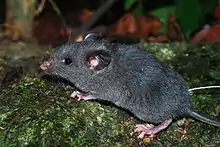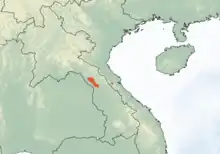Saxatilomys
Saxatilomys paulinae is a species of murid rodent native to central Laos and Vietnam, separated to a monotypic genus Saxatilomys. It was first discovered in the Khammouan Limestone National Biodiversity Conservation Area in Khammouan Province, Laos, and also been found in the Vietnamese province of Quang Bình.[2] It is the only known species in the genus Saxatilomys.[3] The genus name is derived from the Latin saxatilis, meaning "among the rocks" and the Greek mys, meaning mouse or rat.[3]
| Saxatilomys | |
|---|---|
 | |
| Scientific classification | |
| Domain: | Eukaryota |
| Kingdom: | Animalia |
| Phylum: | Chordata |
| Class: | Mammalia |
| Order: | Rodentia |
| Family: | Muridae |
| Tribe: | Rattini |
| Genus: | Saxatilomys Musser, 2005 |
| Species: | S. paulinae |
| Binomial name | |
| Saxatilomys paulinae Musser et al., 2005 | |
 | |
Description
It resembles, and is likely closely related to, species in the genera Niviventer and Chiromyscus. Saxatilomys is distinguished from these and other Indomalayan genera by "semispinous dark gray upperparts, dark frosted gray underparts, large, extremely bulbous footpads, and a combination of derived and primitive cranial and dental traits".[3]
Habitat
It is thought to be petricolous and has only been observed in forested, rocky limestone habitats.[3]
References
- Kennerley, R.; Laginha Pinto Correia, D. (2016). "Saxatilomys paulinae". IUCN Red List of Threatened Species. 2016: e.T136806A22411127. doi:10.2305/IUCN.UK.2016-1.RLTS.T136806A22411127.en. Retrieved 18 November 2021.
- Nguyen, Nghia; Nguyen, Dang; Ngo, Tuong; Nguyen, Duy (2015). "New data on recently described rodent species Paulina's Limestone Rat Saxatilomys paulinae Musser, Smith, Robinson & Lunde, 2005 (Mammalia: Rodentia)". Biodiversity Data Journal. 3 (3): e4961. doi:10.3897/BDJ.3.e4961. PMC 4442251. PMID 26023285.
- Musser, G.G.; Smith, A.L.; Robinson, M.F. & Lunde, D.P. (November 2005). "Description of a New Genus and Species of Rodent (Murinae, Muridae, Rodentia) from the Khammouan Limestone National Biodiversity Conservation Area in Lao PDR" (PDF). American Museum Novitates (3497): 1–31. doi:10.1206/0003-0082(2005)497[0001:DOANGA]2.0.CO;2. hdl:2246/5666. ISSN 0003-0082. S2CID 86334292.
